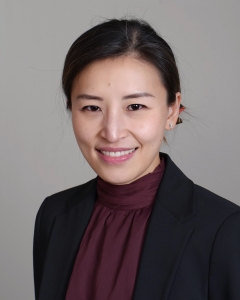People Profile: Dr. Qingwen (Wen) Kawaji

Qingwen (Wen) Kawaji, MD (PGY-5, General Surgery)
Qingwen (Wen) Kawaji, MD, (PGY-5, General Surgery) has a Charm City Football flag hanging in her office as a reminder of the town she calls home. Baltimore is not only where she met her husband and completed higher education, but it’s also where she was first inspired to pursue medicine while working on a research project with a general surgeon at Johns Hopkins University. She’s fallen in love with the hands-on work of surgery and the impact she can make on her patients.
“You see a problem, you fix it, and patients have an immediate change of symptoms. If a patient comes in with appendicitis, you take out the appendix, and the next day that pain is gone,” Dr. Kawaji says. “That is always extremely gratifying. A lot of times in medicine you don’t always get to see those immediate results.”
Dr. Kawaji has stepped into leadership roles during her time at MedStar Health, serving as the Academic Chief Resident for the MedStar Baltimore general surgery residency program and a resident representative on the Graduate Medical Education Committee (GMEC). She is passionate about her work on the GMEC and the opportunity to work alongside her colleagues on the GMEC as well as GME leadership to turn resident concerns into action items.
Dr. Kawaji encourages residents and fellows to take advantage of the peer-to-peer listening sessions hosted by the resident GMEC representatives and submit feedback so the GMEC can improve the program and strengthen the educational opportunities available to residents and fellows.
“It’s really hard if GME leadership doesn’t know what we need, and that’s where me and my colleagues get to be that channel to make sure that resident concerns and needs are brought to the right people,” Dr. Kawaji says.
Dr. Kawaji’s work on the GMEC is driven by her desire to turn problems into solutions, and by her appreciation for the comradery and community among the residents and fellows. It’s one of the things Dr. Kawaji appreciates most about working at MedStar Health. She explains that even though there are times where medicine can be tough, it’s important to share those challenges with your colleagues. “However you feel, you’re definitely not alone,” she says.
Dr. Kawaji encourages her colleagues to look at the big picture: “Everything you do, as little as it is – it could be a diet order you’re putting in – that will have an impact. You’re taking care of a person, and that’s truly a privilege. What you do truly has a meaning, it has an impact.”
“We’re all here in the hospital to do the same thing: take exceptional care of our patients.”



